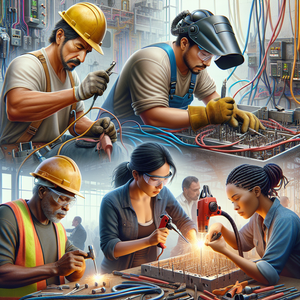
Skilled Trades: 10 Careers Resilient to AI Automation Over the Next 30 Years
In a world increasingly influenced by artificial intelligence (AI), the future of many professions appears uncertain. However, skilled trades stand out as robust careers likely to endure amidst the rise of automation. These trades hinge on manual dexterity, intricate problem-solving, and a personal touch—qualities that machines struggle to replicate. In this article, we will explore ten skilled trades expected to thrive over the next 20 to 30 years. We will delve into the unique complexities of each profession, their vital roles in society, and how they adapt to technological advancements. Additionally, we will provide insights into educational pathways, average salaries, projected job growth, and personal anecdotes from those in the field, presenting a compelling argument for anyone considering a career in these essential sectors.
Job Summaries:
Electrician:
- Electricians are key players in maintaining the electrical systems that power our homes and businesses.
- Beyond installing and repairing systems, they interpret blueprints and ensure compliance with safety standards.
- The journey to becoming an electrician typically involves completing an apprenticeship that melds classroom learning with hands-on experience.
- With electrical systems growing in complexity, job opportunities in this field are projected to rise by 8% over the next decade.
- Electricians earn an average annual salary ranging from $50,000 to $75,000, making it a secure career choice.
- A seasoned electrician shared, 'Every day presents a new challenge, and that’s what keeps the job exciting.'
- For current job openings, click here.
Plumber:
- Plumbers are essential for ensuring safe and efficient water and gas systems.
- They read blueprints, inspect systems, and adhere to local codes, all while tackling issues that arise unexpectedly.
- A formal apprenticeship is typically required, followed by state licensing.
- The plumbing industry is expected to grow by 5%, with average salaries between $45,000 and $70,000 annually.
- A plumber we spoke to remarked, 'Nothing feels better than knowing I’ve solved a problem that directly impacts someone’s safety.'
- For job listings in this field, click here.
HVAC Technician:
- HVAC technicians play a crucial role in maintaining comfortable indoor environments.
- They handle the installation, repair, and routine maintenance of heating and cooling systems.
- After technical schooling, earning relevant certifications is essential.
- The HVAC sector is projected to see a 4% growth, with average salaries between $45,000 and $70,000 per year.
- One technician noted, 'The technology is always evolving, which means we have to keep learning and adapting.'
- For available positions, click here.
Carpenter:
- Carpenters bring structures to life, working with wood and other materials to construct and repair everything from homes to furniture.
- The path to becoming a carpenter often starts with vocational training or an apprenticeship following high school.
- The industry expects a 5% job growth over the next decade, with average salaries from $40,000 to $65,000 annually.
- A carpenter shared, 'Every piece I create has a story, and I love that I get to leave my mark on the world.'
- For current job openings, click here.
Welder:
- Welders are vital in construction and manufacturing, using high heat to join metal parts securely.
- They interpret blueprints and apply various welding techniques, often following vocational training and obtaining certifications.
- Job growth for welders is projected at 3%, with average salaries ranging from $40,000 to $65,000 per year.
- A welder reflected, 'Precision is key in this job; it’s not just about joining metal, but doing it right.'
- For job opportunities in welding, click here.
Mechanic:
- Automotive mechanics ensure vehicles run safely and efficiently.
- Their role involves diagnosing problems and repairing various components.
- Prospective mechanics typically undergo training at trade schools or through apprenticeships, gaining certifications along the way.
- The automotive repair industry anticipates a 4% growth, with average salaries between $40,000 and $70,000 annually.
- A mechanic expressed, 'Every car is different, and figuring out the unique quirks of each one is what I enjoy most.'
- For available mechanic positions, click here.
Mason:
- Masons excel in working with bricks, stones, and concrete, constructing durable structures while ensuring aesthetic appeal.
- Aspiring masons often complete an apprenticeship after high school.
- The industry expects a 5% job growth, with salaries averaging between $40,000 and $60,000 per year.
- One mason shared, 'It’s about more than just building; it’s about creating something that lasts.'
- For current job listings in masonry, click here.
Roofing Contractor:
- Roofing contractors specialize in installing and repairing roofs, a vital aspect of any building’s integrity.
- Many learn their trade through apprenticeships or on-the-job training.
- The roofing industry anticipates a 6% growth, with average salaries ranging from $40,000 to $65,000 annually.
- A roofing contractor remarked, 'It’s tough work, but knowing you’ve protected someone’s home is incredibly rewarding.'
- For job opportunities in roofing, click here.
Elevator Installer and Repairer:
- Elevator installers and repairers ensure the safety and efficiency of vertical transportation systems.
- This role typically requires a high school diploma and an apprenticeship.
- Job opportunities in this field are expected to grow by 7%.
- Average salaries range between $50,000 and $80,000 annually.
- One installer noted, 'The technical challenges we face daily keep us on our toes and require a blend of skills.'
- For current openings, click here.
Firefighter:
- Firefighters are on the front lines during emergencies, extinguishing fires and saving lives.
- This demanding profession requires extensive training in fire suppression and emergency medical response.
- A high school diploma and specialized training at a fire academy are prerequisites.
- The demand for firefighters is projected to grow by 5%.
- Average salaries range from $40,000 to $70,000 annually.
- A firefighter shared, 'Each call is unpredictable, and the need for quick, human judgment is what makes our role irreplaceable.'
- For job listings in firefighting, click here.
These summaries illuminate the enduring demand for skilled trades, highlighting their essential roles within our communities. The unique combination of hands-on expertise, creative problem-solving, and adaptability in these professions makes them resistant to automation. As technology continues to evolve, those seeking stable and fulfilling careers may find that these skilled trades offer not only job security but also personal satisfaction and a meaningful impact on society. Exploring these pathways could lead to a rewarding future in an ever-changing job market.
Explore More Jobs

